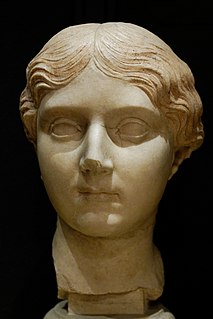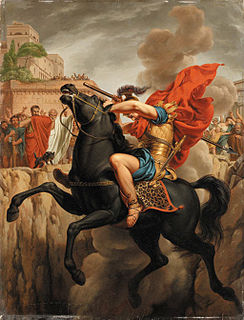The 10s decade ran from January 1, AD 10, to December 31, AD 19.

Antonia the Elder was a niece of the first Roman emperor Augustus, being the eldest daughter of Octavia the Younger and her second husband the Triumvir Mark Antony. She married Lucius Domitius Ahenobarbus and became the maternal grandmother of empress Messalina as well as paternal grandmother of the emperor Nero.

Tiberius Claudius Caesar Britannicus, usually called Britannicus, was the son of Roman emperor Claudius and his third wife Valeria Messalina. For a time he was considered his father's heir, but that changed after his mother's downfall in 48, when it was revealed she had engaged in a bigamous marriage without Claudius' knowledge. The next year, his father married Agrippina the Younger, Claudius' fourth and final marriage. Their marriage was followed by the adoption of Agrippina's son, Lucius Domitius, whose name became Nero as a result. His step-brother would later be married to Britannicus' sister Octavia, and soon eclipsed him as Claudius' heir. Following his father's death in October 54, Nero became emperor. The sudden death of Britannicus shortly before his fourteenth birthday is reported by all extant sources as being the result of poisoning on Nero's orders—as Claudius' natural son, he represented a threat to Nero's claim to the throne.
Gaius Rubellius Plautus was a Roman noble and a political rival of Emperor Nero. Through his mother Julia, he was a relative of the Julio-Claudian dynasty. He was the grandson of Drusus, and the great-grandson of Tiberius and his brother Drusus. Through his great-grandmothers Vipsania Agrippina and Antonia Minor, he was also descended from Marcus Vipsanius Agrippa and Mark Antony. He was descended from Augustus' sister Octavia Minor, herself a grand-niece of Julius Caesar.
Publius Pomponius Secundus was a distinguished statesman and poet in the reigns of Tiberius, Caligula, and Claudius. He was suffect consul for the nundinium of January to June 44, succeeding the ordinary consul Gaius Sallustius Crispus Passienus and as the colleague of the other ordinary consul, Titus Statilius Taurus. Publius was on intimate terms with the elder Pliny, who wrote a biography of him, now lost.
Gaius Sallustius Passienus Crispus was a prominent figure in the Roman Empire during the first century. He held the consulship twice, and was stepfather of the future emperor Nero.

The gens Pompeia was a plebeian family at ancient Rome, first appearing in history during the second century BC, and frequently occupying the highest offices of the Roman state from then until imperial times. The first of the Pompeii to obtain the consulship was Quintus Pompeius in 141 BC, but by far the most illustrious of the gens was Gnaeus Pompeius, surnamed Magnus, a distinguished general under the dictator Sulla, who became a member of the First Triumvirate, together with Caesar and Crassus. After the death of Crassus, the rivalry between Caesar and Pompeius led to the Civil War, one of the defining events of the final years of the Roman Republic.
Quintus Pomponius Secundus was a Roman aristocrat of the first century, and consul suffectus in AD 41 as the colleague of Gnaeus Sentius Saturninus. His brother was the poet and statesman Publius Pomponius Secundus, and their half-sister, Milonia Caesonia, was the second wife of the emperor Caligula.
Vistilia was a Roman matron of the gens Vistilia known by her contemporaries for having seven children by six different husbands; Pliny the Elder was more impressed by the fact most of her pregnancies were remarkably brief. Five of her sons became consuls, her daughter Milonia Caesonia became Roman empress through her marriage to Caligula, and her granddaughter Domitia Longina became empress through her marriage with Domitian. Due to her fertility Vistilia became a byword for prodigious fecundity in antiquity.
Marcus Vinicius was twice Roman consul and, as husband of Julia Livilla, grandson-in-law (progener) of the emperor Tiberius. He was the son and grandson of two consuls, Publius Vinicius and Marcus Vinicius.
Marcus Aurelius Cotta Maximus Messalinus was a Roman Senator who was a friend of the first two Roman emperors Augustus and Tiberius.
Paullus Fabius Maximus was a Roman senator, active toward the end of the first century BC. He was consul in 11 BC as the colleague of Quintus Aelius Tubero, and a confidant of emperor Augustus.

Gaius Silius was a Roman senator who was nominated as consul designate for 49 AD, but was executed by the emperor Claudius for his affair with the empress Valeria Messalina.
Servius Cornelius Scipio Salvidienus Orfitus was a Roman senator, and consul ordinarius for the year 51, as the colleague of the emperor Claudius. His father Orfitus was one of the seven sons of Vistilia, a noblewoman who came from a family that had held the praetorship, although some have erroneously stated Servius himself was the husband of Vistilia. He became a member of the gens Cornelia through adoption by an otherwise unknown Servius Cornelius Scipio.

The gens Curtia was an ancient but minor noble family at Rome, with both patrician and plebeian branches. The only member of the gens invested with the consulship under the Republic was Gaius Curtius Philo, in 445 BC. A few Curtii held lesser magistracies during the Republic, and there were two consuls suffectus in imperial times. However, the gens is best remembered from a series of legends dating from the traditional founding of the city to the early Republic.
The gens Domitia was a plebeian family at ancient Rome. The first of the gens to achieve prominence was Gnaeus Domitius Calvinus, consul in 332 BC. His son, Gnaeus Domitius Calvinus Maximus, was consul in 283, and the first plebeian censor. The family produced several distinguished generals, and towards the end of the Republic, the Domitii were looked upon as one of the most illustrious gentes.
Gaius Vibius Rufinus was a Roman senator, who flourished during the early first century. He was suffect consul as the colleague of Marcus Cocceius Nerva in August of a year during the first half of the first century; which year is still in dispute. Rufinus was an acquaintance of the poet Ovid, who addressed two of his poems to him from his exile in Tomis.
Lucius Pomponius Flaccus was a Roman senator, who held a number of imperial appointments during the reign of Tiberius. He was consul in AD 17 with Gaius Caelius Rufus as his colleague.
The gens Suillia, occasionally written Suilia, was a minor plebeian family at ancient Rome. Members of this gens are first mentioned under the early Empire. The first of the Suillii to obtain the consulship was Publius Suillius Rufus, early in the reign of Claudius.